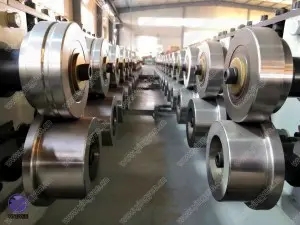
The Ceiling T Bar Roll Forming Machine A Versatile Solution for Modern Construction
In the ever-evolving construction industry, efficiency and precision are paramount. Among the myriad of tools and machines that facilitate the building process, the Ceiling T Bar Roll Forming Machine stands out as a pivotal asset for manufacturers and contractors alike. This machine is designed specifically for producing T-shaped bars, which are essential elements in suspended ceiling systems, providing structural support and aesthetic appeal.
Functionality and Design
The Ceiling T Bar Roll Forming Machine utilizes a series of rollers to transform flat metal sheets into T-shaped components. The process begins with feeding the raw material—typically galvanized steel or aluminum—into the machine. Through a sequence of rollers, the material is gradually shaped into T bars of varying lengths and dimensions. The precision of this machine ensures that every T bar produced meets the high standards required in modern construction projects.
This machine is equipped with state-of-the-art technology, including automatic control systems that facilitate seamless operation. Operators can easily adjust the dimensions and specifications of the T bars with a few simple inputs. This versatility not only streamlines production but also allows for customized solutions to meet specific project requirements.
Benefits of Using Ceiling T Bar Roll Forming Machines
One of the primary advantages of using a Ceiling T Bar Roll Forming Machine is the efficiency it brings to the production process. Traditional methods of manufacturing T bars can be labor-intensive and time-consuming. In contrast, roll forming drastically reduces the time taken to produce large quantities of T bars, allowing manufacturers to meet tight deadlines without compromising quality.

Moreover, the precision of the roll forming process minimizes waste. By optimizing the use of raw materials, manufacturers can significantly reduce costs associated with production inefficiencies. This aspect is particularly crucial in an industry where profit margins are often tight, and cost control is essential.
Another notable benefit is the durability of the products produced. T bars formed through this process are not only structurally sound but also resistant to corrosion, thanks to the materials commonly used in their production. This longevity translates to lower maintenance costs over the life cycle of the building, making it a smart investment for contractors and developers.
Applications in the Construction Industry
Ceiling T bars are integral to various applications within the construction sector. They form the skeleton of suspended ceilings, allowing for the installation of tiles, panels, and lighting systems while hiding electrical wiring and ductwork. This versatility enables designers to create aesthetically pleasing and functional spaces in commercial and residential buildings alike.
Furthermore, the demand for T bars is on the rise as modern architectural trends favor open and adaptable office spaces. The efficiency of use and installation of suspended ceilings makes Ceiling T Bars a popular choice among builders aiming for both elegance and practicality.
Conclusion
In conclusion, the Ceiling T Bar Roll Forming Machine represents a significant advancement in the manufacturing of ceiling supports. Its efficiency, precision, and adaptability make it an invaluable resource in the construction industry. As architects and builders continue to push the boundaries of design, the role of such innovative machinery will only grow, contributing to the realization of ambitious construction projects around the globe. Investing in this technology is not merely a business decision, but a commitment to quality and excellence in building practices.